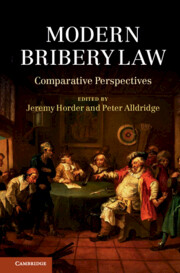Book contents
- Frontmatter
- Contents
- List of contributors
- Table of cases
- Table of statutes and international instruments
- Introduction
- Part I Bribery law: between public wrongdoing and private advantage-taking
- Part II Bribery without borders: tackling corruption in the EU and beyond
- 4 Bribery in Italy: an outlook on present laws and perspectives on reform
- 5 Development, business integrity and the UK Bribery Act 2010
- 6 The aims and limits of European Union anti-corruption law
- 7 Deterring bribery: law, regulation and the export trade
- Part III Ill-gotten gains: the challenge of prosecution, enforcement and asset recovery
- Bibliography
- Index
- References
6 - The aims and limits of European Union anti-corruption law
from Part II - Bribery without borders: tackling corruption in the EU and beyond
Published online by Cambridge University Press: 05 May 2013
- Frontmatter
- Contents
- List of contributors
- Table of cases
- Table of statutes and international instruments
- Introduction
- Part I Bribery law: between public wrongdoing and private advantage-taking
- Part II Bribery without borders: tackling corruption in the EU and beyond
- 4 Bribery in Italy: an outlook on present laws and perspectives on reform
- 5 Development, business integrity and the UK Bribery Act 2010
- 6 The aims and limits of European Union anti-corruption law
- 7 Deterring bribery: law, regulation and the export trade
- Part III Ill-gotten gains: the challenge of prosecution, enforcement and asset recovery
- Bibliography
- Index
- References
Summary
Introduction
The question of how best to tackle corruption by legal means has proven to be far from straightforward, as demonstrated by the recent debates surrounding domestic law reform in the field. The question becomes even more complex when one looks at the European Union. For the European Union to legislate, it is not enough to simply establish a justification for the adoption of legislation; it is also necessary, in the light of the EU’s constitutional structure, to establish in advance that the European Union has the competence to legislate and that power has been conferred to the EU by the Member States. It is essential in this context to establish the appropriate legal bases in the EU treaties, which are linked to specific EU policies and objectives. It is from this, constitutional, perspective that this chapter will attempt to map and evaluate the emergence of EU anti-corruption law. The content of EU law in the field will be assessed in the light of the constitutional aims it has been designed to achieve. In doing so, the constitutional limits to the development of anti-corruption law will also be highlighted, with the underlying questions being how has EU anti-corruption law been shaped in the light of the evolving EU constitutional law? and what are the prospects for the future? Emphasis will be placed on the changes brought forward by the Lisbon Treaty and related policy developments in the field of EU criminal and internal market law, as well as on the relationship between internal and external EU action against corruption.
The aims of EU anti-corruption law
A key challenge when legislating on corruption is to locate a concrete justification and need for the adoption of anti-corruption law. This is particularly evident in the field of criminal law, where opinions on why it is necessary to criminalise corruption (attempting to locate the harm in corruption) diverge considerably. The justification of anti-corruption law as necessary to protect a variety of different legal interests (a justification linked to the different views on the harm caused by corruption) is particularly relevant at the level of the European Union, where legislation on corruption has been linked to safeguarding a variety of EU objectives, ranging from the protection of the EU budget to the rule of law.
- Type
- Chapter
- Information
- Modern Bribery LawComparative Perspectives, pp. 160 - 195Publisher: Cambridge University PressPrint publication year: 2013
References
- 2
- Cited by



